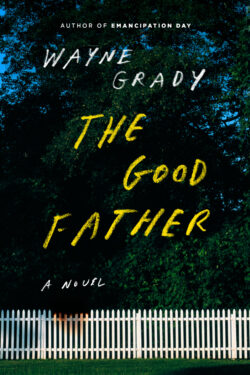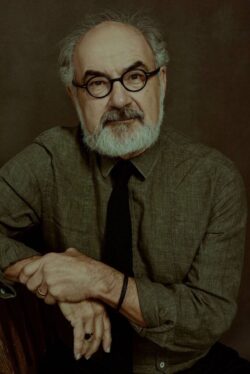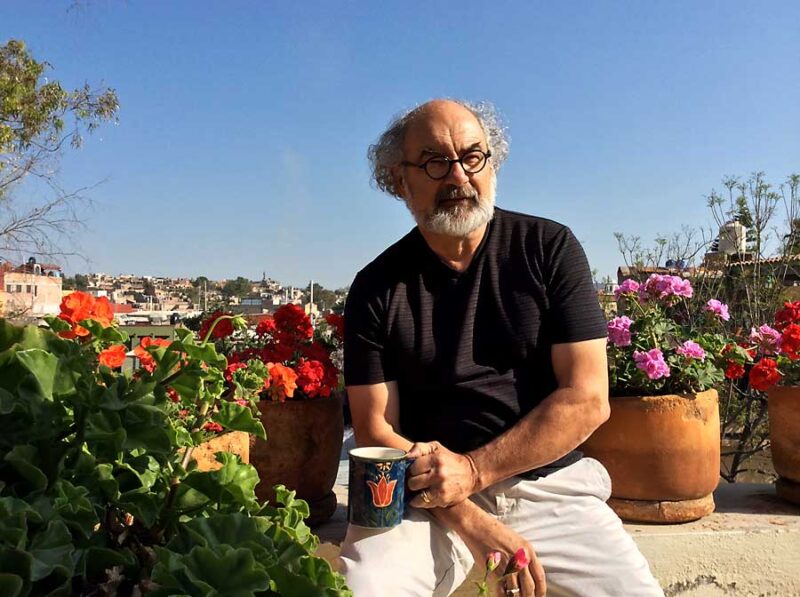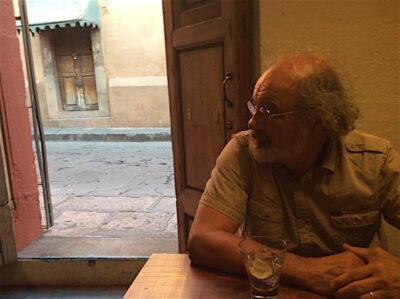1126 Retreat, rescue, repair
The Good Father
by Wayne Grady
Toronto: Penguin Random House (Doubleday Canada), 2021
$24.95 / 9780385694667
Reviewed by Ginny Ratsoy
*
 Readers with a predilection for touching, even heartbreaking, plots served up with a good measure of satire and acerbic one-liners will be satiated by the latest from UBC professor Wayne Grady. Set in 2009-2010, with an update in 2018-19, and unfolding mainly from a third-person perspective, The Good Father moves between a focus on middle-aged Harry Bowes, by turns a journalist, teacher and wine merchant, with a serious drinking problem, and his daughter Daphne, a 20-something UBC drop out with some addictions of her own. Harry is a 21st Century Canadian Everyman, well-intentioned and caring but undemonstrative, and more acted upon than acting. Environmentalist Daphne is at once brainy, street smart, and naïve. The title is both straightforward and ironic: Harry Bowes is a devoted and neglectful father to Daphne.
Readers with a predilection for touching, even heartbreaking, plots served up with a good measure of satire and acerbic one-liners will be satiated by the latest from UBC professor Wayne Grady. Set in 2009-2010, with an update in 2018-19, and unfolding mainly from a third-person perspective, The Good Father moves between a focus on middle-aged Harry Bowes, by turns a journalist, teacher and wine merchant, with a serious drinking problem, and his daughter Daphne, a 20-something UBC drop out with some addictions of her own. Harry is a 21st Century Canadian Everyman, well-intentioned and caring but undemonstrative, and more acted upon than acting. Environmentalist Daphne is at once brainy, street smart, and naïve. The title is both straightforward and ironic: Harry Bowes is a devoted and neglectful father to Daphne.

The inciting incident that unravelled the filial bond, conveyed through memory, goes back to the turn of the century: Harry’s departure from his wife and daughter in (small town Ontario) White Falls to take a contract teaching position at York University. To Harry, the departure was straightforward: his community college job ended abruptly (he was “beloved by his students, belittled by his colleagues, and beleaguered by the dean” (p. 96)), his marriage was a shell (his shadowy wife more enamoured of her politician boss than her husband) and his consideration for Daphne included financial provisions, as well as ensuring space for her Toronto visits. To ten-year-old Daphne, whom he urged to take care of her mother, it was a bombshell — the start of a precipitous fall.
Each adapts to the changing circumstances in their own way, as they inevitably drift apart. Harry enjoys teaching for as long as it lasts, and then pivots to the spirits business, along the way establishing a live-in relationship with Elinor, a psychology professor. The adolescent Daphne, who shares her father’s mind for literature, manipulates her limited circumstances as much as possible, while being manipulated by drugs. Grady comes down hard on the small Ontario town, giving a nod to Robertson Davies, as Daphne, recollecting in 2019, applies the setting of What’s Bred in the Bone to White Falls: the bland, decaying small town, absent of promise, and source of a distinctive attitude that follows its inhabitants all the days of their lives, whether they stay or go. When Daphne goes (as soon as possible) she is initially a promising UBC undergrad. Eventually, though, she mimics her life in White Falls on a superficially loftier scale when she takes up with a high-powered lawyer and gravitates to fancier circumstances and the drugs to go with them – and, on her decline, drops Harry and Elinor from her life. In Grady’s Vancouver, the distance between the Hotel Vancouver and the Downtown East Side is short metaphorically, as well as literally, and it is in a dumpster in the latter location that Harry, after a long search, finds and rescues (or kidnaps, depending on the character’s perspective) his daughter.

Through Daphne’s eyes, the eight years between 2010-2018 are told in retrospect. After she spent a year rebuilding herself in a suite in Harry and Elinor’s place, she returned to Vancouver, eventually leading a cleaner life and revisiting Toronto to repay the favour when Harry needed her.
Daphne in 2018-19 owns a Vancouver condo and works for a film company. If moving to Toronto had been “like taking a space ship to a dead planet (p. 9),” Vancouver now seems to her “hastily thrown up and as easily torn down, like a film set” (p. 288). It is while she is scouting for a movie location for a script about a father-daughter relationship that she finds her spiritual home. Once again (think Douglas Coupland, Thomas King, and Michael Christie) the far left coast is an Edenic setting; Daphne finds refuge in Cortes Island. There, she is finally able to commune with the spirit of Harry. Rather than each talking “sideways” as they had often done when he was alive, the two come together in an imagined dialogue that is at once literary and personal. The daughter understands her father’s side of the story and takes comfort in his good intentions, rescue of her, and their last days together.

How the father-daughter relationship plays out has much to do with when and where it is played out, and, as Grady takes us through earlier iterations of social and political issues still in progress, he captures recent Canadian history superbly. Along with Harry, we explore neo-liberalism, the decline of traditional journalism, and the precarity of academic employment. Along with Daphne, we witness the growth of veganism, the opioid crisis, lives lived largely online, the BC wildfires, and the controversy around the Enbridge pipeline. This reader experienced deep laughter and even deeper shudders as she re-lived the general claustrophobia of the Harper years.
The Good Father illuminates the misdeeds, miscommunication, and regrets in the relationships that define us in the 21st Century. Harry’s major romantic relationships dissolve and his friendships with fellow males are sadly, if comically, detached. In the relationship that is at the story’s core, some measure of redemption is achieved, and Daphne experiences inner peace.
Novelists from Robertson Davies to Miriam Toews have viewed distinctions between the comic and the tragic as artificial, and, considering how many of my favourite reads are both hilarious and harrowing, I must concur. Reading Wayne Grady’s The Good Father, richly layered with both, is time well spent.
*
Ginny Ratsoy, Professor Emerita at Thompson Rivers University, writes, ambles, and volunteer teaches in Kamloops. Editor’s note: Ginny Ratsoy’s recent reviews include books by Angie Abdou, Josephine Boxwell, Caroline Adderson, Melanie Jackson, Estella Kuchta, Madeline Sonik, Mary MacDonald, Lauren Soloy, and Nick Tooke.
*
The Ormsby Review. More Books. More Reviews. More Often.
Publisher and Editor: Richard Mackie
The Ormsby Review is a journal service for in-depth coverage of B.C. books and authors. The Advisory Board consists of Jean Barman, Wade Davis, Robin Fisher, Cole Harris, Hugh Johnston, Patricia Roy, David Stouck, Maria Tippett, and Graeme Wynn. Scholarly Patron: SFU Graduate Liberal Studies. Honorary Patron: Yosef Wosk. Provincial Government Patron since September 2018: Creative BC
“Only connect.” – E.M. Forster
4 comments on “1126 Retreat, rescue, repair”